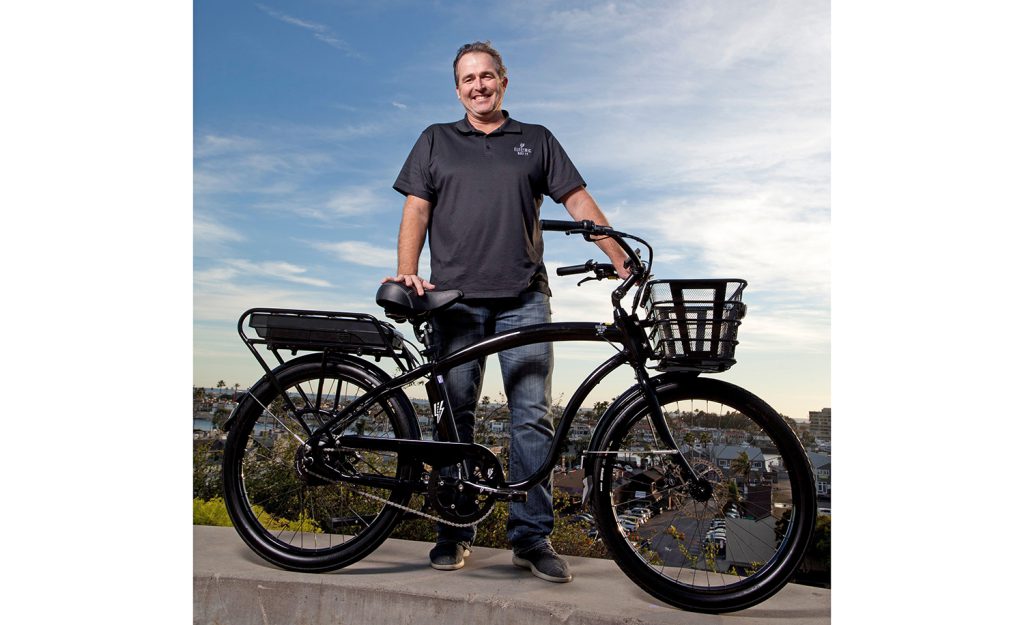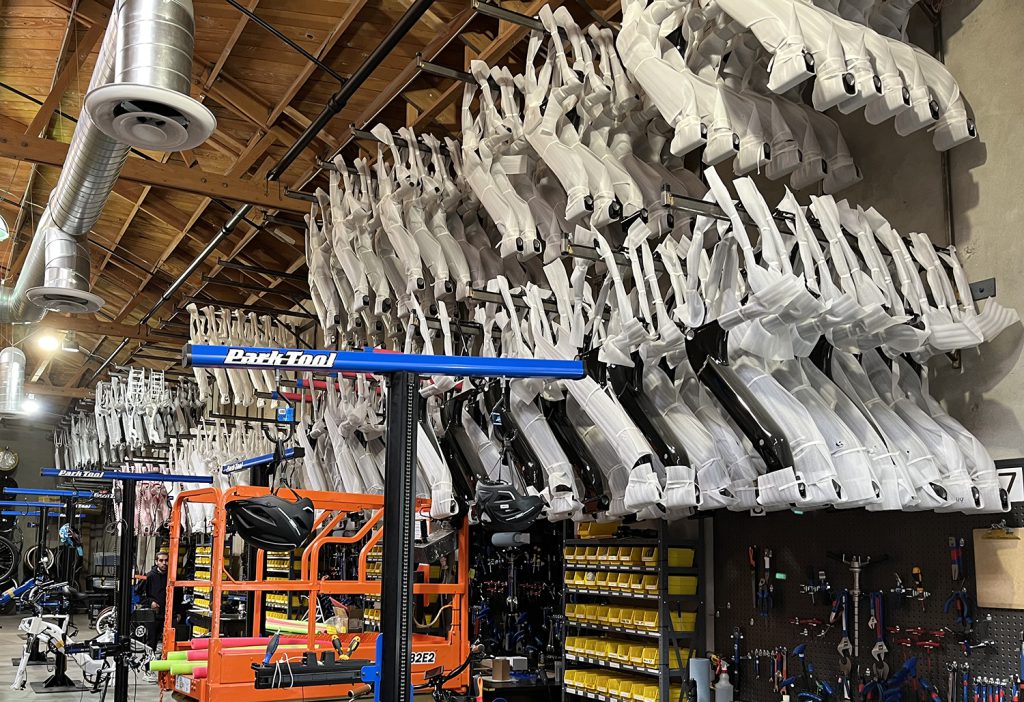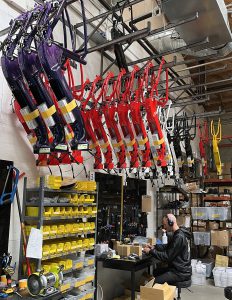
Few people have heard of the Madiba Bike Company. Unfortunately, among those few were attorneys who sued South African-born entrepreneur Sean Lupton-Smith out of the bicycle business, albeit temporarily.
The reason? South African anti-apartheid activist and politician Nelson “Madiba” Mandela had (upon his lawyers’ recommendations) trademarked that name worldwide.
Undeterred, Lupton-Smith pondered the power of names, realized that the best monikers incorporated the type of product to be marketed, and thus was born The Electric Bike Company in 2014, in Newport Beach.
Step back to 1998: Lupton-Smith followed his brothers, Mark and Craig, to the states on his own dime, after both siblings were awarded tennis scholarships to major universities. At the time, there were no scholarships for adventure kayakers, which Lupton-Smith was. In fact, he may have been lucky to arrive in the states at all, since his paddling efforts were down untamed, crocodile-and-hippo-infested rivers. He also took to sea kayaking in the waters off Cape Town, where Great Whites by the thousands were considered guppies if they didn’t reach at least 24-feet in length.
After college, the brothers bought into a restaurant franchise in Atlanta, GA, called the Atlanta Bread Co. Unfortunately, brother Mark passed away, so Lupton-Smith took over the franchise, which he grew to 17 outlets.
“At that point I was lucky enough to sell the business,” he recounted.
Retired and restless, Lupton-Smith returned to South Africa, with the intention of “giving back.” A believer in “prosperity through mobility,” he focused on Zimbabwe, where people were beginning to earn some money, but still were unable to buy bicycles. So, Lupton-Smith reasoned, why not make low cost/low maintenance bikes somewhere, then ship them to South Africa, for distribution — and ultimate economic potential for people willing to pedal beyond their homes to distant employment.

Between trips to South Africa and the U.S., once again Lupton-Smith followed a brother, this time to Southern California. It was while walking through Fashion Island in 2012 that he watched a guy zip about on an electric bike. Lupton-Smith’s entrepreneurial gears were about to spin faster. After two years of research — which included frame manufacture, parts sourcing, cyclist psychology, and strategic marketing courses — he built his first electric bike at a 3,000 square foot combo showroom and factory on Newport Boulevard.
In a crowded market, differentiation is one key to success. Lupton-Smith’s in-depth research revealed in part that the majority of bike riders are recreational riders ages 45 and older. They are taking to the road both individually and in groups. The concept of an electric boost for a bike encouraged those with ailing knees to realistically take up two-wheel recreation and transportation, and for some the soaring prices of gasoline meant driving was becoming a financial burden.
To that end, the Electric Bike Company focuses exclusively on “cruising bikes.”
But not simple cruising bikes: “The best made cruising bikes in the world,” Lupton- Smith claims. His self-assessment was echoed in an objective bike industry article in 2017 by one of the most respected e-bike reviewers, who opined, “This is one of the finest cruisers that I have ever seen.”

That one review launched not a thousand ships, but more than 100,000 bikes manufactured since Lupton-Smith opened shop. The Electric Bike Company today produces revenues in excess of $20 million a year and receives countless queries for acquisition from other bike manufacturers and investors.
“Not interested,” he stated.
Lupton-Smith has set quality standards not seen in most competitive products, starting with staff “who are more than just employees — they’re true craftsmen and women who love their work and the industry itself.”
Most are bike riders. In fact, when giving this writer a tour of one facility, part of an 85,000 square foot collection of local manufacturing sites, Lupton- Smith stopped to praise the team that packages the bikes for shipping, which in itself became an art form of protection comprised of sturdy cardboard, foam and more — almost a bomb shelter of integrity against the threats of mass shipping.
“We have 44 builders, engineers, craftsmen, and inspectors, not including office staff — importantly, all local talent,” Lupton-Smith said.
Unlike his competition, The Electric Bike Company does not import complete bikes, whose parts most likely, Lupton-Smith shares, come from limited sources within a country of origin.
The Electric Bike Company imports custom-made, over-engineered components from different manufacturers in 17 countries, most of which Lupton-Smith has visited in his search for the highest quality parts. Some of those countries include Japan, Holland, Taiwan, China, India, Israel, and Germany. Custom accessories, such as helmets and bike racks, are manufactured in Vietnam.
Because everything is assembled in Newport, and nearby, customers can custom order their bikes at the store. Aiding the process is a “design wall” in the show room, a huge TV screen on which all seven bike models are displayed, alongside a pallet of more than 10,000 color variations. If a customer wishes, the paint shop will custom spray every paintable part of a bike in a different hue.
All options can be ordered on-site, onscreen. Seventy dealers out of more than 250 across the U.S. offer this screen tech, which also benefits the retailer, as they don’t require a huge in-store inventory. However, finished models do come in standard colors off the showroom floor.
Today’s e-bikes are a far cry from the underpowered models of early years. Most are equipped with a rear-drive motor of 750 watts output, which can propel the 50-pound bikes up to 28 mph (if local laws allow). Speed, as well as other critical data for the rider, is shown on the full-color LCD display.
Depending on battery chosen and terrain ridden, range runs from 40 miles to 200 miles. Add pedal power to the electric assist, and the horizon is never far away. The Electric Bike Company offers a five-year warranty on the batteries — whereas most e-bike batteries come with a one or two-year protection plan.
Lupton-Smith admits that “e-bikes do not replace the traditional bike,” but notes that more people are using them in place of cars, weather permitting.
Both ordering and riding Electric Bike Company e-bikes is easy…in fact, it’s no sweat! See the e-bike line at The Electric Bike Company’s Newport showroom, 1510 Newport
Blvd. inb Newport Beach, or go online to www.Electricbikecompany.com.
Contact writer Richard Simon at [email protected]
